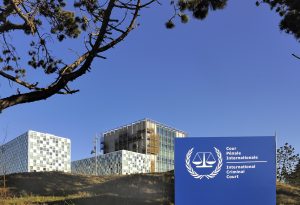Philippine President Ferdinand Marcos Jr. says that his government will not block the International Criminal Court (ICC) from investigating his predecessor Rodrigo Duterte for his bloody anti-drugs crackdown, if the ex-leader is willing to be investigated.
Marcos’s remarks came after a congressional hearing on Wednesday during which Duterte again refused to apologize for his role in the violent anti-drug campaign and, in a defiant outburst, urged the ICC to start its investigation.
“I am asking the ICC to hurry up, and if possible, they can come here and start the investigation tomorrow,” he told the hearing, according to Rappler. “This issue has been left hanging for many years.”
Speaking to reporters in Manila yesterday, Marcos said that while his administration will stick to its long-standing position that it will not cooperate with ICC investigators, it would not stand in their way if Duterte was willing to surrender himself to the court. “If that’s the wish of (Duterte), we will not block ICC,” he said. “But if he agrees to be investigated, it is up to him.”
In a later statement, Marcos’s office issued a statement indicating that while it would not cooperate with the ICC, it would feel obliged to arrest Duterte if it received an official “red notice” from Interpol, requesting his arrest on the ICC’s behalf.
“The government will feel obliged to consider the red notice as a request to be honored, in which case the domestic law enforcement agencies shall be bound to accord full cooperation,” the president’s executive Secretary Lucas Bersamin said in the statement.
Duterte’s anti-drugs campaign, which began the moment he was sworn into office in mid-2016, was modeled on the tough approach he employed during his years as mayor of Davao City on the southern island of Mindanao. Estimates of the number killed during the campaign range from 12,000 to as many as 30,000. Most were young men in congested urban areas who were shot dead during “encounters” with police, but the victims also included children and other innocents who were caught in the crossfire.
The campaign quickly caught the attention of the ICC. In 2019, prosecutors at the court announced that they had started a preliminary probe into the drug war killings, prompting Duterte to withdraw the Philippines from the Rome Statute that created the ICC.
In September 2021, judges at the ICC authorized an investigation into Duterte’s campaign, describing it as a “widespread and systematic attack against the civilian population.” The ICC investigation covers acts such as killings that took place between July 1, 2016, when Duterte came to office, and March 16, 2019, when Duterte withdrew the Philippines from the ICC. It also covers extrajudicial killings allegedly committed during Duterte’s time as mayor of Davao City in the southern Philippines from November 2011 to June 2016.
Duterte’s comments came as he appeared for the first time at a House of Representatives committee that has been formed to investigate his “war on drugs.” The 79-year-old has already appeared at a parallel Senate committee on the drug campaign, which was initiated by Duterte allies, including Senator Ronald Dela Rosa, who as the former president’s police chief oversaw the initial phase of the campaign.
During his testimony on Wednesday, Duterte repeated his earlier claims that he had nothing to apologize for in his unyielding stance on illegal narcotics. “I have nothing to hide. What I did, I did it for my country and for the young people,” he told the hearing. “No excuses. No apologies. If I go to hell, so be it.”
“I am already old, I might die soon. You might miss the pleasure of seeing me standing before the court hearing the judgment whatever it is,” Duterte said, adding he assumed full responsibility for what happened.
Scrutiny of the drug war has increased due to the bitter feud between the Duterte and Marcos camps, which united and scored a landslide victory in the 2022 election. Over the past year, the two clans and their supporters have fallen out over a mix of policy and personal differences, and are preparing to do battle during next year’s mid-term elections. The House Committee was expressly set up by Marcos’ congressional allies to pressure the former leader, whose daughter, Vice President Sara Duterte, has now grown estranged from the Marcos camp.
It is unclear how seriously to take Duterte’s comments regarding the ICC investigation. His career has been marked by similar outbursts and hyperbole, and as Rappler reported, Duterte’s Wednesday testimony “was peppered with flip-flopping and backtracking here and there.”
In the context of the Dutertes’ ongoing battle with the Marcos family, the threat of an ICC investigation looms as a potential trump card. Acceding to Duterte’s rash statement, the president is able to increase pressure on his rivals without taking the step of openly welcoming an ICC probe, Carlos Conde, a senior researcher for the rights group Human Rights Watch, told Rappler.
“By essentially letting Duterte create the opening for the ICC intervention, the Marcos administration would come off as less brutal in this war with the Dutertes,” he told the news site. “By using Duterte’s thoughtlessness at the [Committee] hearings, Marcos can wash his hands of any responsibility for the inevitable investigation here by the ICC.”
































